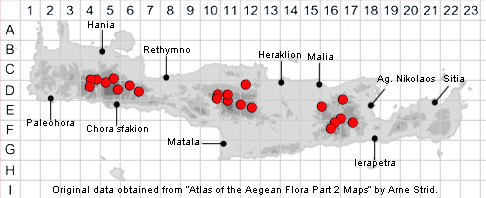SPECIES DESCRIPTION
ASPERULA IDAEA
Family and Genus:- See- RUBIACEAE/Sect. CYNANCHICAE
Common Names:- None
SHomotypic Synonyms:- None
Meaning:- Asperula (L) Little rough one.
Idaea (L) From Mount Ida in Crete.
General description:- A dwarf sparsely hairy shrub.
Shoots:-
1) Green, rarely pulvinate or pruinose, with patent hairs up to 0·3 mm or
sometimes slightly rough.
2) Flowering shoots, 3-10(-15) cm, procumbent, slender.
Stems:-
1) 3-15 cm, caespitose to pulvinate.
a) middle internodes, mostly 1-2 times as long as the leaves.
Leaves:-
1) In whorls of 4, 4-10 mm, linear, with somewhat revolute margins and prominent
midrib beneath, acute to shortly aristate, hirsute.
Flowers:-
1) Inflorescence, of one or a few small, capitate cymes.
2) Bracts, somewhat united.
3) Corolla 3·2-5 mm, slender with an abruptly expanding limb, hypocrateriform to
narrowly infundibuliform, pink, with dense, patent, short hairs outside,
sometimes slightly rough;
a) tube, 2-3 times as long as the lobes;
b) lobes, obscurely furnished with an appendage.
Fruit:-
1) Mericarps, c. 1.5 mm, hispid or acutely tuberculate.
Key features:-
1) Stems, usually less than 15 cm.
2) Inflorescence, usually with only 1-3 ± capitate flower-clusters.
3) Plant, caespitose or laxly pulvinate.
4) Internodes, 1-2 times as long as the leaves.
5) Corolla, 3·2-5 mm.
6) Plant, with hairs up to 0·3 mm.
7) Fruit, 1-1·5 mm.
Habitat:- Rocky limestone slopes with low scrub of Berberis cretica, Quercus
coccifera. etc., and dolines with thorn-cushion communities. (650-)1200-2300 m.
Distribution:- Cretan endemic, known from the three main massifs, where it is
locally fairly abundant.
Flowering time:- Late May to July.
Photos by:- Steve Lenton
Status:-
Protection status (for threatened species): Greek Presidential Decree 67/1981

